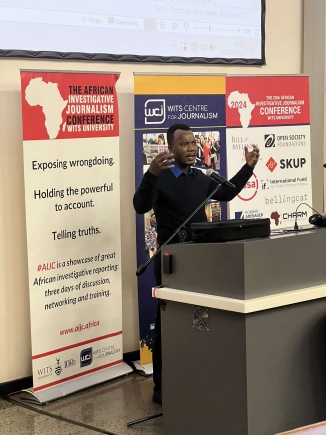
Don’t be afraid to die - Edward Adeti addresses AIJC colleagues in South Africa
Ghana’s current Journalist of the Year, Edward Adeti, has urged fellow journalists not to allow the fear of death to discourage them from telling the truth for the public good.
The investigative journalist, who has worked with a number of reputable media houses in Ghana and now writes for Media Without Borders, is well-known for a series of threats and persecution he has been through in connection with his works.
He is a speaker at the ongoing 20th edition of the African Investigative Journalism Conference (AIJC) in Johannesburg, South Africa.
“Journalists should not be afraid of pain, hunger, rejection and death. The truth is that whether you speak the truth or not, you will still go. It is better to speak the truth and go well. “Leonardo da Vinci said, ‘As a day well spent gives a joyful sleep, so does a life well spent give a joyful death’. As journalists, we should be as very true to ourselves as possible so that we finish our mission on earth and we should be smiling when we are about to die,” he said during a session at the conference.
He made a presentation during the session on the recent investigative story that earned him Ghana’s topmost journalism award, “Stealing from the Sick”.
The story reveals how Ghana lost millions of cedis in medicines stolen on a massive scale for about two years from the Upper East Regional Hospital in Ghana.
The thefts caused rampant shortages of drugs at the public hospital, resulting in loss of lives and deterioration of the conditions of some patients.
The investigation led to the arrests and ongoing criminal trial of some members of the syndicate responsible for the thefts.
Africa’s foremost investigative journalist, Anas Aremeyaw Anas, addressed the conference afterwards in the same session.
He stressed the need for investigative journalists to get hold of hardcore evidence when they were engaged in a mission to expose wrongdoing.
He said having such evidence was the finest way to effectively substantiate claims made that a crime had been committed, particularly when the need arose in a law court.
“When I go undercover, I am taking evidence that I know that when I stand in the court of law with that evidence, that person (the culprit) will be jailed. Those are the key things I look at when I go undercover. “This attracts a lot of criticism. For example, when I was doing this story on football, I was sued 66 times and I won all. I’m just trying to emphasise the fact that hardcore evidence is the key to the work we do,” he stated.
“When you say a crime has been committed, you’ve got to be able to substantiate the fact that the said crime has been committed. It doesn’t also make undercover a first line. “Undercover is always the last line. When all conventional cameras cannot put that evidence together, that is when you decide to go undercover,” he added.
Excerpts of some of the investigative works Anas undertook in the past and a recent one he did with the BBC — “Slavery at Sea”— were shown to the audience during the session.
Anas’ “Slavery at Sea” is a story about Africans who underwent a lot of pain as a result of being trafficked to Scotland.
It highlights the victims’ experiences and how the person responsible for their plight was investigated through an undercover operation and arrested.
Speaking further, Anas said he was not unaware that some people disagreed with him but affirmed that he was least bothered about their opinions as long as his works had a useful impact on society.
“I also would agree with some of our colleagues who disagree, who think that journalists ought to be separate and journalists cannot be activists. I don’t care what you call me. What I consider important is the positive impact that I have on society.
“That is what is important to me. So, when I set out to do that piece of work, I take into consideration the fact that as good men sit and plan to effect good in society, so do evil people also sit and plan. Of course, this job comes with a lot of dangers,” he stated.
The session was moderated by one of Ghana’s globally known investigative journalists, Emmanuel K. Dogbevi, who is also a speaker at the conference.
Some other speakers are expected to feature in different sessions at the three-day conference which began on Wednesday and ends on Friday, this week.
